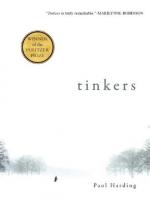
|
| Name: _________________________ | Period: ___________________ |
This test consists of 15 multiple choice questions and 5 short answer questions.
Multiple Choice Questions
1. The narrator says in the opening of Chapter 4, "During the days, George was aware of a large group of people murmuring and flowing in and out of the room as if on tides." What literary device is used in this sentence?
(a) Personification.
(b) Simile.
(c) Literary allusion.
(d) Onomatopoeia.
2. Where does George live in 1953?
(a) Boston, Massachusetts.
(b) Enon, Massachusetts.
(c) Philadelphia, Pennsylvania.
(d) Cleveland, Ohio.
3. What food does Megan prepare for Howard before she leaves to care for her mother over Christmas in Chapter 4?
(a) Roasted lamb and new potatoes.
(b) Roasted turkey and apple pie.
(c) Tuna casserole and peach cobbler.
(d) Meatloaf and banana cream pie.
4. What were Ed Titcomb and his friend doing when they came upon Howard in the woods in Chapter 3?
(a) Collecting arrowheads.
(b) Gathering firewood.
(c) Hunting.
(d) Going to their mother's house.
5. What color does the green sea turn in the excerpt from Chapter 4 called "Homo Borealis"?
(a) White.
(b) Black.
(c) Gray.
(d) Red.
6. Edward Billings is the manager of what bank frequented by George?
(a) The Rollins-Dunn Bank.
(b) The Salem Five Bank.
(c) The Bank of America.
(d) The Rochester County Bank.
7. What month is it when Howard describes his mother helping his father dress before his father is taken away in Chapter 3?
(a) January.
(b) September.
(c) March.
(d) April.
8. What word used in Chapter 3 means characterized by low buffoonery?
(a) Intrinsic.
(b) Epidemic.
(c) Articulate.
(d) Scurrilous.
9. What word in Chapter 3 refers to a repository for relics?
(a) Cantrell.
(b) Colloquialism.
(c) Reliquary.
(d) Illuminant.
10. What does Howard's mother cook for breakfast the morning after Howard's father has been taken away in Chapter 3?
(a) Blueberry muffins.
(b) Porridge.
(c) Pancakes.
(d) Oatmeal.
11. What word from Chapter 4 means serving as a relief?
(a) Corrective.
(b) Demonstrative.
(c) Exorbitant.
(d) Palliative.
12. The Zulu people that are mentioned in the novel are an ethnic group from where?
(a) Northern Africa.
(b) South America.
(c) Southern Africa.
(d) Eastern Europe.
13. What is the first step in the excerpt called "How to Make a Bird's Nest" in Chapter 4?
(a) Take a piece of yarn.
(b) Take a piece of rotten cardboard.
(c) Take a wafer of tinker's tin.
(d) Punch holes near the base of the triangle.
14. George reveals that he has an inscribed first edition printing of what novel in one of his safety deposit boxes in Chapter 4?
(a) Alice in Wonderland.
(b) The Scarlet Letter.
(c) The Old Man and the Sea.
(d) The Great Gatsby.
15. The narrator says of George as he dies in Chapter 4, "His bloodless legs were hard like wood." What literary device is used in this sentence?
(a) Simile.
(b) Onomatopoeia.
(c) Literary allusion.
(d) Forced perspective.
Short Answer Questions
1. What does Howard describe his father doing all of the time in Howard's childhood in Chapter 3?
2. What is Howard's father's profession?
3. The narrator says in Chapter 3, "My blood is a Roman plow." What literary device is used in this excerpt?
4. The term "moors" from the novel was used in Europe to describe what group of people?
5. What does Howard witness a fish do as he sits in the pond watching the Indian in Chapter 3?
|
This section contains 536 words (approx. 2 pages at 300 words per page) |

|




